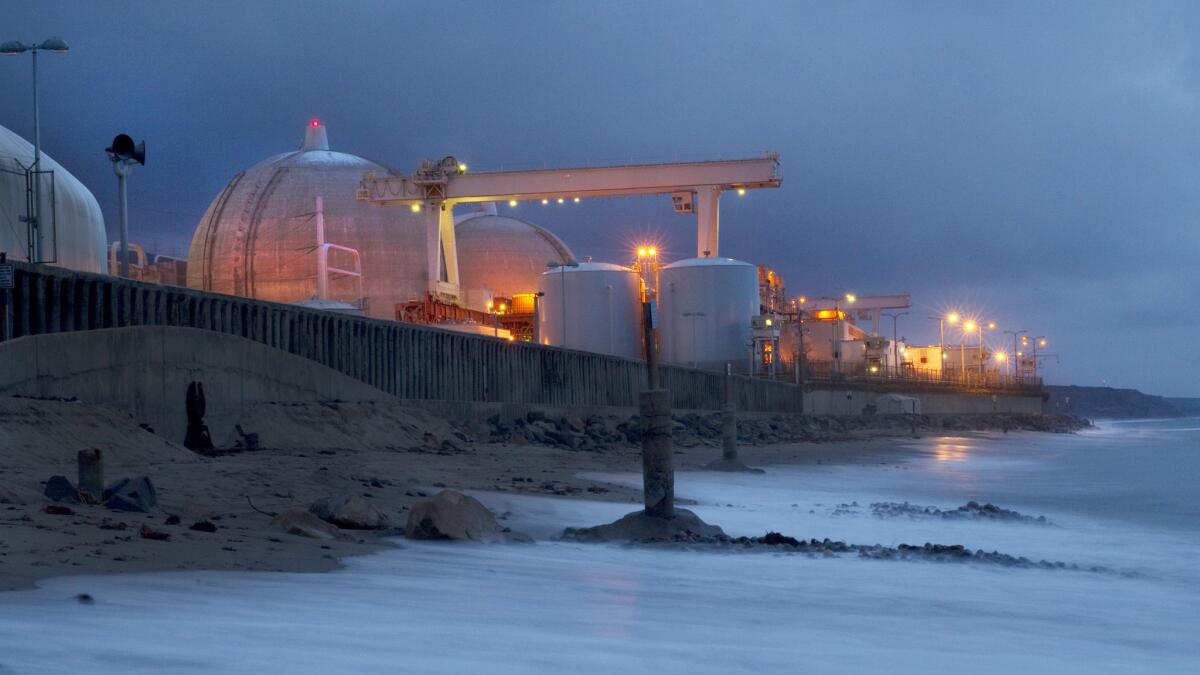Even after reforms, the state’s energy regulator can still have private meetings with utility companies

Reporting from Sacramento — For years, state lawmakers have been trying to crack down on private meetings between utility companies and members of the California Public Utilities Commission after revelations that top officials and industry executives had frequent dinner dates, shared talking points and even sketched out details of the multibillion-dollar closure of a Southern California nuclear power plant during a secret rendezvous in a luxury hotel in Poland.
The push culminated in a deal announced in June between Gov. Jerry Brown and legislators to force both agency and utility leaders to disclose more details of their contacts and stiffen penalties if they don’t.
For the record:
7:56 p.m. Nov. 24, 2024An earlier version of this story spelled the last name of Ralph Cavanagh of the Natural Resources Defense Council as Cavanaugh.
But the measure, part of a package of bills reforming the commission that remain under discussion in the final few days of this year’s legislative session, has worried some advocates and observers that it won’t do enough to break up the close relationship between power companies and those overseeing them.
Robert McCullough, a consultant who investigated the state energy system during the Enron Corp. scandal in 2001, argued there shouldn’t be any private communications between regulators and the industry when they’re deciding electric and gas rates for consumers.
“The amounts of money are so huge and the potential for abuse is so great that even just a pinkie on the scale can mean millions or tens of millions [of dollars],” McCullough said.
The federal government and a majority of other states with similar regulatory bodies don’t allow ex parte communications, or discussions in which all interested parties aren’t present, in these cases, according to a 2014 study by UC Berkeley’s Center for Law, Energy & the Environment.
“There’s a huge concern about the fairness of the process when certain parties can gain access to decision-makers behind closed doors,” said Deborah Behles, an environmental attorney who co-wrote the report.
The PUC has been under the microscope since a natural gas pipeline explosion killed eight people in Bay Area suburb of San Bruno six years ago.
Attention quickly focused on the relationship between the agency’s leaders and executives from Pacific Gas & Electric. Emails released in the wake of the explosion showed frequent chummy communications, including references to sharing bottles of wine while discussing the energy business and a request from a PG&E executive to hold off visiting a company control room during an audit because of unspecified problems there.
The outcry only grew after a criminal investigation into the PUC’s activities revealed a secret March 2013 meeting in a Warsaw hotel during an energy conference between a Southern California Edison executive and then-PUC President Michael Peevey regarding the shutdown of the San Onofre nuclear power plant. PUC regulators also have been criticized for not acting fast enough to prevent safety issues that eventually led to last year’s Aliso Canyon gas leak in Porter Ranch, which lasted four months and forced thousands from their homes.
The series of incidents led to criminal and internal investigations involving the PUC and utility companies. Michael Strumwasser, an attorney hired by the agency to examine its ex parte communication practices, concluded regulators and energy executives were interpreting them in ways that led to decisions made outside the public’s view.
“The PUC was kind of like a submarine with an open window,” Strumwasser said in an interview. “They had lots of apparent protection, but you wouldn’t want to take this boat under the water.”
The agency has since reopened its decision to saddle consumers with most of the costs to shutter San Onofre after Edison was fined almost $17 million for failing to disclose the secret talks.
Last year, legislators sent five bills to Brown’s desk to reform the PUC, including one from state Sen. Mark Leno (D-San Francisco) that would have banned private communications between regulators and utilities when deciding rates.
Brown vetoed all of them, saying that although he agreed the agency needed reform, the bills tried to do too much at the same time and would be difficult to implement. He pledged to work with lawmakers this year on an overhaul.
The effort picked up steam in early June when the Assembly, on a bipartisan vote, passed a proposed constitutional amendment by Assemblyman Mike Gatto (D-Glendale) that would have given voters the opportunity to break up the PUC and allow the Legislature to assign all its responsibilities to other agencies.
Less than a month after that vote, Brown, Gatto, Leno and state Sen. Jerry Hill (D-San Mateo) announced the reform package. Gatto then agreed to drop his constitutional amendment.
The deal also led Leno to remove the outright ban on ex parte meetings from his bill. He instead added the transparency provisions and upped the penalties for failing to disclose the communications.
“The governor would have vetoed it again,” Leno said of the need to revamp his original proposal. “They were very clear. This was a negotiated compromise. We went as far as we could.”
A spokesman for Brown said the governor wanted to preserve the ability for everyone involved in ratemaking cases to speak with PUC commissioners, and therefore ensure agency leaders had a diversity of perspective — a view shared by some environmental, technology and other advocates.
Ralph Cavanagh, the co-director of the Natural Resources Defense Council’s energy program, said adding disclosure to the ex parte process would be far better than banning it.
“If you have commissioners hermetically sealed and cut off from the world which they’re supposed to be regulating, they’re going to make poor decisions,” Cavanagh said.
“If you’re worried about corruption, if you’re worried about excessive influence of certain parties, the solution is transparency and disclosure,” he continued.
Leno’s bill passed the Legislature last Thursday with unanimous support and is now on Brown’s desk.
The PUC overhaul involves many more changes. A measure from Gatto would transfer the responsibility of regulating Uber, Lyft and other ride-hailing companies along with other transportation services out of the PUC, and would also study moving the telecommunications industry to a different agency. Gatto has argued that the PUC is spread too thin to focus on its core responsibilities with energy companies. A third bill from Hill would allow easier public access to PUC documents among other changes to boost transparency in agency proceedings.
The Gatto and Hill bills are still pending in the Legislature, and Brown has pledged to sign all three.
Follow @dillonliam on Twitter
ALSO
Beset by scandals, the state’s energy regulator is facing a massive reorganization
State regulators reopen case on San Onofre nuclear plant
Brown vetoes transparency bills for troubled state utilities commission
More to Read
Get the L.A. Times Politics newsletter
Deeply reported insights into legislation, politics and policy from Sacramento, Washington and beyond. In your inbox three times per week.
You may occasionally receive promotional content from the Los Angeles Times.











